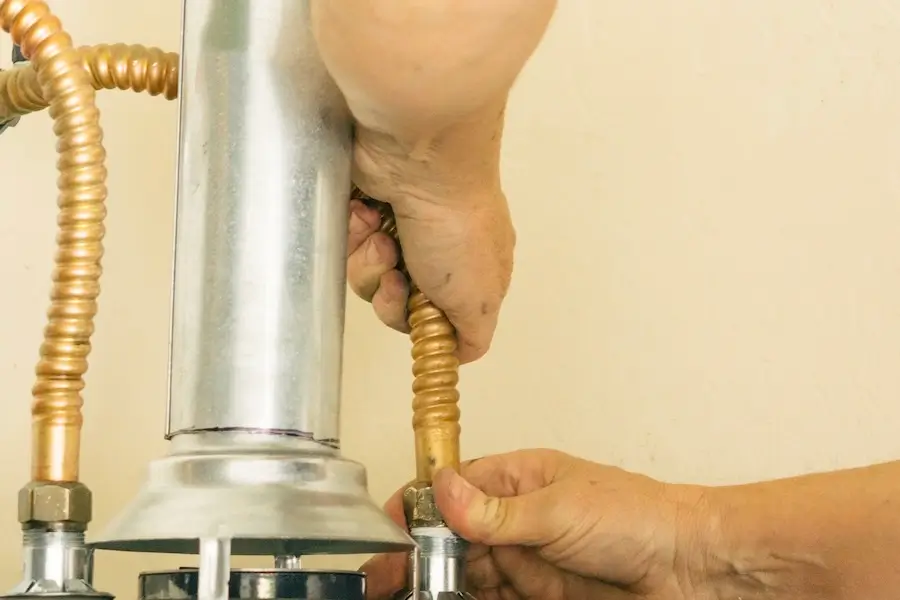Summary:
Mr. Rooter Plumbing® shares the signs that indicate your water heater could be about to die:
- Strange Noises – Sounds like popping, hissing, or rattling often signal sediment build-up, high pressure, or failing components.
- Inconsistent Water Temperature or Pressure – Fluctuating temperatures or low hot water pressure may indicate failing heating elements or sediment issues.
- Insufficient or No Hot Water – A lack of hot water is a common sign that your water heater is struggling or failing.
- Leaks, Discolored Water, or High Bills – Pooling water, rusty water, or sudden energy bill spikes often mean serious internal problems.
- Old Age – Water heaters typically last 8–12 years; problems become more likely as they age.
As much as we would prefer that our home appliances last forever, that’s sadly not the case. Even the most well-made and well-maintained water heaters will eventually stop working. It can be a sad day when you need to call a trusted plumber for water heater replacement.
While the failure of your water heater can come as quite a shock, there are actually many signs that can foretell its impending death. Here’s what to look for:
1. Strange Noises
We're used to our water heaters running quietly in the background, so it can be alarming when they suddenly start making unusual sounds, like hissing, whistling, rattling, popping, or banging.
Strange sounds don’t necessarily mean that your water heater is minutes from failure, but they can mean that you should start investigating their causes. Ignoring them could result in damage that ultimately leads to failure.
Popping, booming, cracking, and rumbling
Possible causes: Sediment build-up at the bottom of your tank
Solution: Flushing and descaling your water heater
Whistling and hissing
Possible causes: High water pressure
Solution: Checking and adjusting the pressure relief valve on your water heater
Ticking, tapping, and rattling
Possible causes: Loose components
Solution: Tightening loose parts or replacing any broken or corroded parts
Buzzing, humming, and sizzling
Possible causes: A failing heating element
Solution: Inspecting and replacing the heating element
Ticking and cracking
Possible causes: Thermal expansion and contraction
Solution: Contact a plumber to ensure these are normal sounds and no action needs to be taken
Sizzling and crackling
Possible causes: Condensation on the burner
Solution: If you notice other sounds or symptoms of concern, contact a plumber to inspect your water heater for any problems
2. Water Temperature Fluctuations
If you’ve noticed temperature changes in your water, call a plumber. Fluctuations or a noticeably lower hot water temperature can indicate potential water heater failure in the near future. However, your local plumbing professional may be able to resolve the issue by replacing a faulty part, such as a thermostat or heating element.
3. Low Water Pressure
While not always a death sentence for your water heater, low water pressure can require further investigation. Discuss the possibility of sediment build-up with your local plumber if your cold water faucet has good water pressure, but your hot water faucet doesn’t.
4. A Lack of Hot Water
If your shower singing sessions are being cut short by a lack of hot water, it’s not always because you’ve used your tank’s full hot water capacity. Failing water heaters struggle to heat water, resulting in a reduced supply of hot water for showers and other plumbing fixtures.
5. Your Electricity Bills Are Unusually High
A failing water heater can be a drain on your electricity. As soon as you notice a higher-than-normal energy bill, start investigating your water heater as a possible cause!
Older water heaters tend to be less efficient than their modern counterparts. However, sediment can also worsen this issue. When minerals settle and accumulate at the bottom of the tank, heat doesn’t transfer evenly throughout the water heater, leading to efficiency issues.
Consult with your local plumber about regular draining to remove sediment or consider investing in a new, more efficient water heater.
6. It’s Leaking
As soon as you notice water pooling around your water heater or leaking from it, contact an emergency plumber without delay. In most situations, a leaking water heater will need to be replaced.
7. The Water is an Unusual Colour
Water coming out of your faucets and shower should be fresh and clear. If it appears yellow or rust-coloured, it might be time to start shopping for a new water heater. Discolouration often relates to the anode rod inside the water tank. This rod is essentially a sacrificial component designed to protect the water heater from corrosion by attracting corrosive elements in the water. Once it succumbs to corrosion, your water heater becomes vulnerable to failure.
The good news is that anode rod failure doesn’t always mean total water heater loss. Consult a trusted plumber about the possibility of replacing the anode rod before your water heater begins to show damage.
How Long Do Water Heaters Last?
Water heaters often fail when you least expect it, typically due to issues like sediment build-up, loose fittings, or high water pressure. However, many also simply reach the end of their working lives as components wear out or rust and corrosion take hold.
Most well-installed, high-quality water heaters last an average of 8-12 years. Tankless water heaters can also last longer. The type of water heater you have and how well you maintain it can also contribute to its lifespan.
Contact Mr. Rooter Plumbing® for Water Heater Repairs, Replacement, and Installation
If you’re worried that your water heater is about to fail, don’t hesitate to contact your locally owned and operated Mr. Rooter Plumbing® for assistance. We can diagnose problems, replace parts, and perform complete water heater replacement if needed.
Our licensed and insured team is available 24/7 to take your call. We look forward to providing the water heater services you need to enjoy consistent, reliable hot water!


